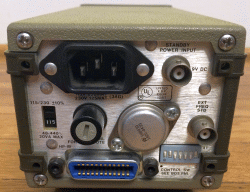These days HP-IB is mostly relegated to test instruments, so HP-IB interfaces for modern computers are not exactly common. I recently purchased an inexpensive (about $40 US) HP-IB (GPIB) to USB interface from LQ Electronics called the UG Simple. The product consists of a single cable with a USB connector at one end and a GPIB connector at the other end, along with an optical disk containing driver software.
The LQ driver provides two functions:
- Gwrite( address, command ) to send command to GPIB device at address
- answer = Gread( address ) to read answer from GPIB device at address
This code compiles in Microsoft's free Visual Studio Community 2019 and produces a Windows console application that demonstrates reading and writing commands from and to the clock using the LQ Electronics UG Simple interface.
- Set clock switches A6 and A7 up (allows the clock to be addressed).
- Set the HPIB_ADDRESS value to the bus address of the clock (clock switches A1 through A5).
- Confirm the location of the .dll file provided by LQ Electronics, used in the Loaddll function.
// LQ_59309.cpp
// Read and set a Hewlett-Packard HP 59309A clock via LQ UGSimple interface
// Last revised 27 April 2019
//
#include <stdlib.h>
#include <stdio.h>
#include <string.h>
#include <time.h>
#include <windows.h>
#include <winuser.h>
#define HPIB_ADDRESS 1
int day_counts[12] = { 31, 28, 31, 30, 31, 30, 31, 31, 30, 31, 30, 31 };
//Define loading function pointers
typedef int (*gwrite1)(int address, char* scpi);
typedef char* (*gread1)(int address);
//point the function pointer to specific function
gwrite1 Gwrite;
gread1 Gread;
void fatal_exit(const char* s)
{
printf("Fatal: %s\n", s);
exit(-1);
}
void Loaddll(void)
{
HINSTANCE hInst = NULL;
hInst = LoadLibrary(TEXT("C:\\Program Files (x86)\\LQElectronics\\UGSimple\\UGSimpleAPI\\LQUGSimple_c.dll"));
if (hInst == NULL)
{
fatal_exit( "Error loading UG DLL" );
}
Gwrite = (gwrite1)GetProcAddress(hInst, "Gwrite");
Gread = (gread1)GetProcAddress(hInst, "Gread");
}
int main()
{
time_t now;
struct tm tm;
int clock_address;
char command[128];
int result;
int i;
char *answer = new char[500];
int month_number;
Loaddll();
now = time(0);
localtime_s(&tm, &now);
printf("Now: %4d-%02d-%02d %02d:%02d:%02d\n",
tm.tm_year + 1900, tm.tm_mon + 1, tm.tm_mday,
tm.tm_hour, tm.tm_min, tm.tm_sec);
clock_address = HPIB_ADDRESS;
// Request the current clock values
command[0] = 'C';
command[1] = '?';
command[2] = 0x00;
result = Gwrite(clock_address, command);
if (result < 0)
exit(-2);
answer = Gread(clock_address);
if (answer)
{
printf("Answer (%d): ", (int)strlen(answer));
for (i = 0; i < (int)strlen(answer); i++)
if ((answer[i] >= ' ') && (answer[i] <= 128))
printf("%c", answer[i]);
else
printf("\\%02X", answer[i]);
printf("\n");
}
else
{
printf("No answer.\n");
}
// Set the time by stopping the clock (P), resetting the clock (R),
// then moving ahead the proper number of seconds (S), minutes (M),
// hours (H) and days (D),
// then start the clock (T)
command[0] = 'P';
command[1] = 'R';
command[2] = 0x00;
result = Gwrite(clock_address, command);
if (result < 0)
fatal_exit("Stop Clock");
// Adjust seconds
for (i = 0; i < tm.tm_sec; i++)
command[i] = 'S';
command[i] = 0x00;
result = Gwrite(clock_address, command);
if (result < 0)
fatal_exit("Set Seconds");
// Adjust minutes
for (i = 0; i < tm.tm_min; i++)
command[i] = 'M';
command[i] = 0x00;
result = Gwrite(clock_address, command);
if (result < 0)
fatal_exit("Set Minutes");
// Set hours
for (i = 0; i < tm.tm_hour; i++)
command[i] = 'H';
command[i] = 0x00;
result = Gwrite(clock_address, command);
if (result < 0)
fatal_exit("Set Hours");
// Set Days
for (i = 0; i < tm.tm_mday - 1; i++)
command[i] = 'D';
command[i] = 0x00;
result = Gwrite(clock_address, command);
if (result < 0)
fatal_exit("Set Days");
// Set months by moving Day counter forward for each month
for (month_number = 0; month_number < tm.tm_mon; month_number++)
{
for (i = 0; i < day_counts[month_number]; i++)
command[i] = 'D';
command[i] = 0x00;
result = Gwrite(clock_address, command);
if (result < 0)
fatal_exit("Set Months");
}
// Start the clock
command[0] = 'T';
command[1] = 0x00;
result = Gwrite(clock_address, command);
if (result < 0)
fatal_exit("Start Clock");
// Clear the bus
command[0] = '?';
command[1] = 0x00;
result = Gwrite(clock_address, command);
if (result < 0)
fatal_exit("Clear Addressed");
exit(0);
}
